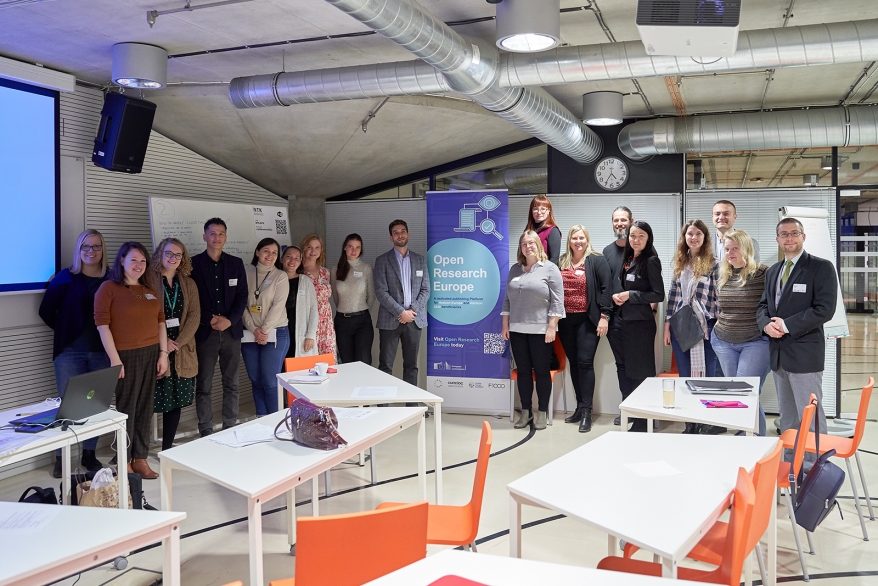On November 9, 2022, Eurodoc collaborated with the Czech National Library of Technology (NTK) and held a focus session to inform the Sustainability Strategy of the Open Research Europe (ORE) project through consultation with the Eurodoc community.
In the spring of 2021, the European Commission launched “Open Research Europe” (ORE) as an innovative Open Access Publishing Platform for Horizon 2020 and Horizon Europe beneficiaries offering rapid publication and open peer review of various article types without editorial bias. All articles benefit from transparent peer review and are published under an open license. The platform is a significant step toward Open Science in Europe. Eurodoc, as an expert partner in the ORE project, is ensuring that the voice of early-career researchers is heard.
In this capacity, Eurodoc planned to organise a focus session in Lviv, Ukraine, in late March 2022, which did not happen due to the war. KRECon 2022 conference in Prague was an excellent opportunity to hold the focus session as a pre-event, as this annual conference offers many additional communication and dissemination opportunities for the organisers and participants.
Representatives of Eurodoc’s Czech, Dutch, French, Hungarian, Italian, Norwegian, Polish, Slovenian, Swedish, and Ukrainian National Associations participated in the focus session to make an introduction of the ORE project and the concept behind it, to discuss ORE and the reform of research assessment and various features of the ORE platform (preprints, open peer review, publishing of diverse research outputs) and co-create ideas on how to support the platform's sustainability, as well as to present Eurodoc’s collaboration with ORE and provide insights from ECRs.
Victoria Tsoukala, Policy Officer-Open Science, European Commission, DG RESEARCH, introduced the audience to the main assets of ORE and its advantages to ECRs, ORE as a collective publishing service (2026 - ), its activities in the political context and steps towards the Coalition for Advancing Research Assessment (CoARA), as well as explained in what way ORE already supports changes in RA.
Oleksandr Berezko, Eurodoc President, put the participants of the focus session in touch with Eurodoc Commitment to Open Science and activities of Eurodoc Open Science Ambassadors and self-assessment rating of knowledge on Open Science and Eurodoc’s cooperation with ORE.
Martin Andler, the President of the Initiative for Science in Europe, of which Eurodoc is a member, joined the focus session and spoke on the importance of improving early career researchers' careers and bringing in young researchers into science, as they are more open to challenges, innovations, and experiment than researchers of the elder generation.
Giulia Malaguarnera, Outreach & Engagement Officer at OpenAIRE, Eurodoc Advisory Board, and the Secretary of the Marie Curie Alumni Association, (MCAA), presented new approaches to research data management in ORE, namely the Data Management Life Style And Research Life Style, ORE’s 4 steps to Open Data, explained how to plan your data and prepare it for sharing, increasing the accessibility and reusability of spreadsheet data, selection of proper repositories, making links through “OpenAIRE Explore” and other relevant issues.
Kelly Woods, Senior Associate Publisher at F1000, talked about the history of the Peer Review process, Open Peer Review as a new approach to increasing viewer times and solving ECRs’ concerns, the peculiarities of Peer Review on ORE, reviewer verification, approval statuses and what they mean for authors, processing times, aspects of other peer review models and misconceptions around “author-led” peer review model.
Sebastian Dahle, Vice President of Eurodoc, discussed the status quo on how Research Assessment impacts Open Science, and how Open Research Europe is an amazing opportunity to advance science in Europe and a major factor in better science in Europe overall. He also presented the Agreement on Reforming Research Assessment and opening of the Agreement for signatures, which in many cases still presents a lot of challenges, Open Science and Research Assessment and the OPUS project.
The focus session further included a group discussion: the participants were divided into three groups and discussed the above-mentioned topics in detail, particularly, the responsible use of metrics and how to deal with the administrative burden of qualitative assessment, criteria for the submission of the thesis and funding criteria for the doctoral candidates, rehabilitation criteria and accessibility of ORE, training of ECRs, academic freedom and other relevant issues. Eurodoc plans to summarize the discussion and come up with a report based on its results to be published in Open Access.
We cordially thank Martin Svoboda (NTK Director) and Eva Hnátková (Open Science Coordinator at NTK) for the opportunity to organise this focus session at NTK and for all the warm hospitality! We look forward to furthering our collaboration.

